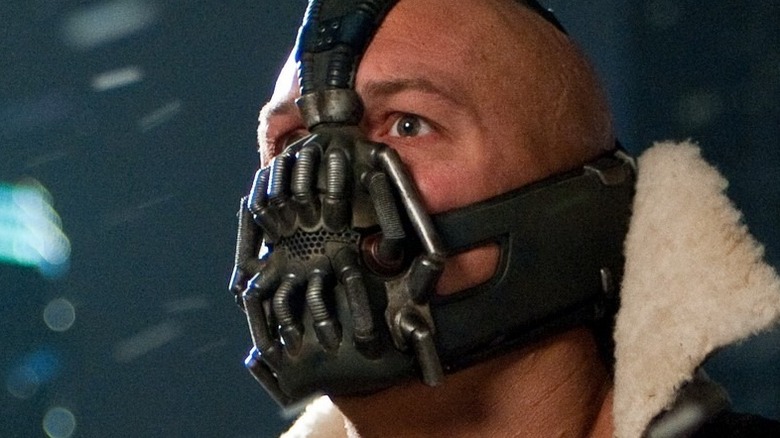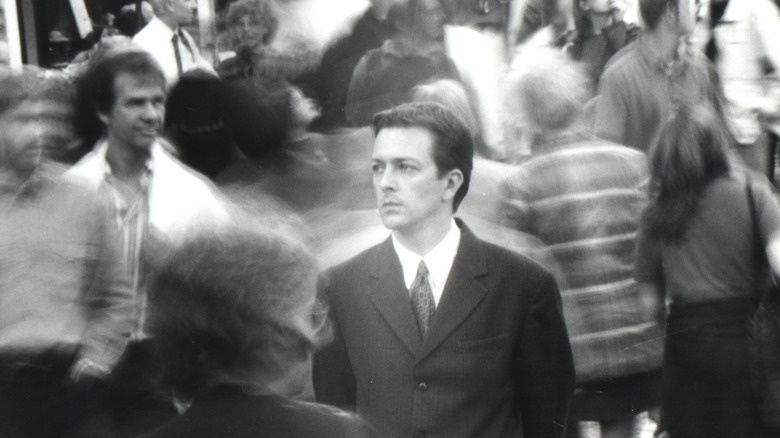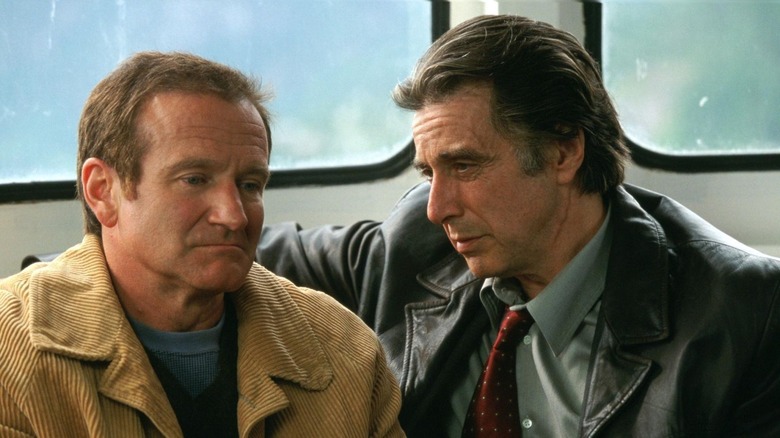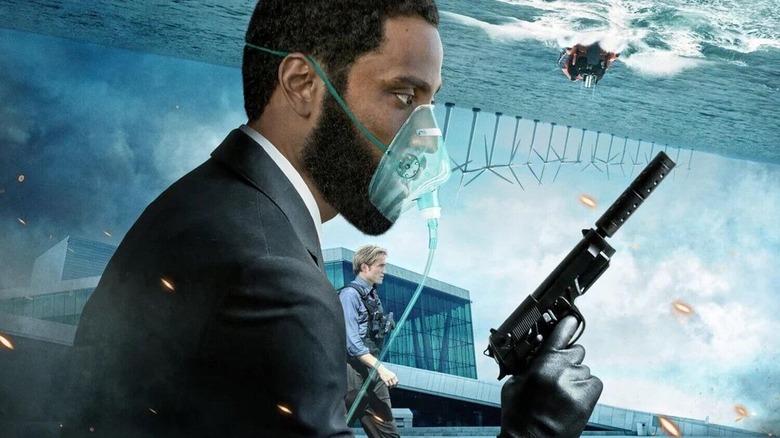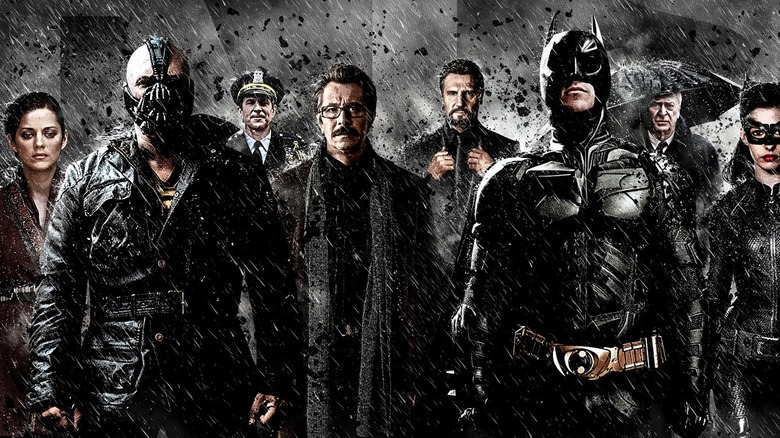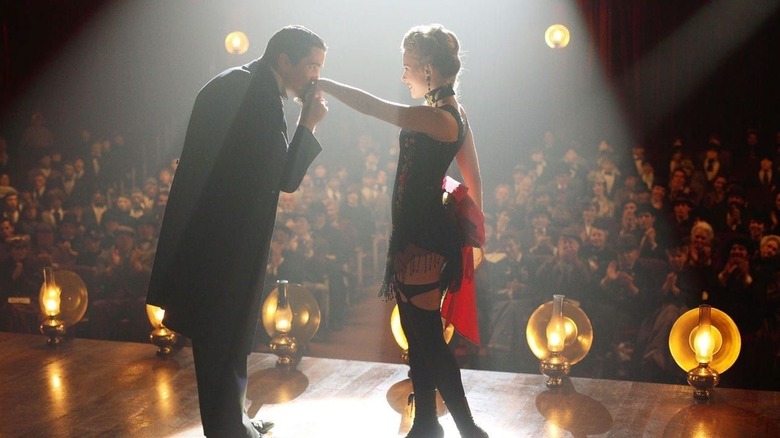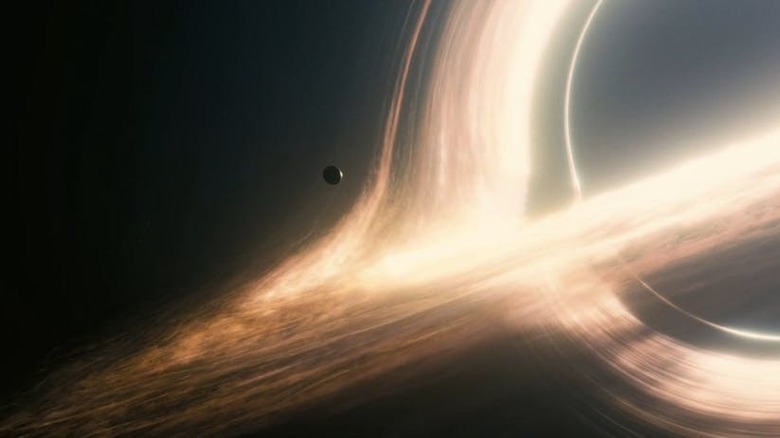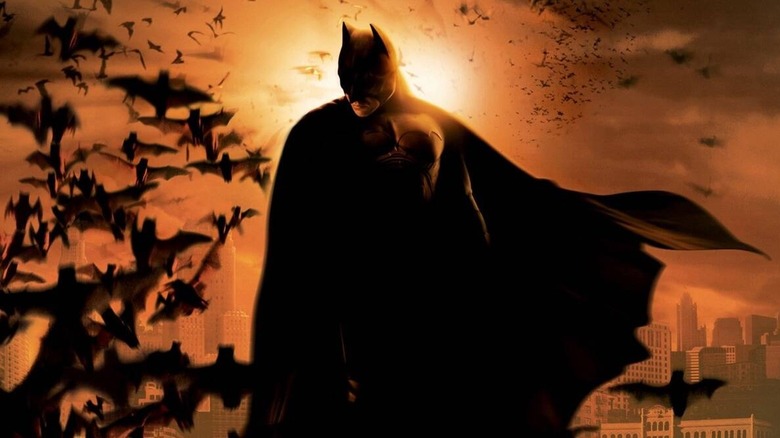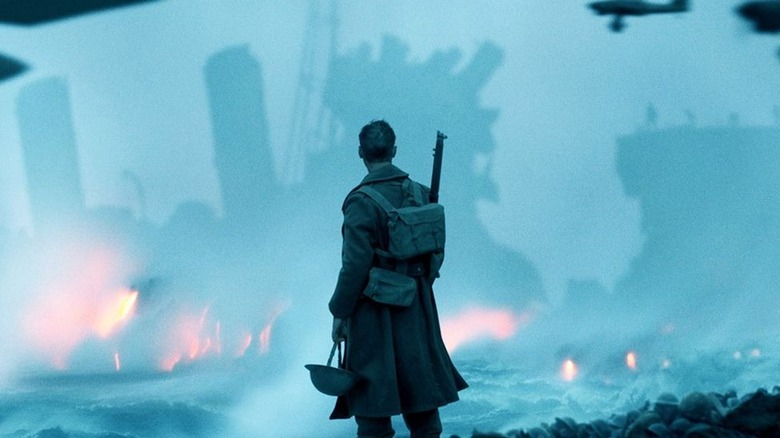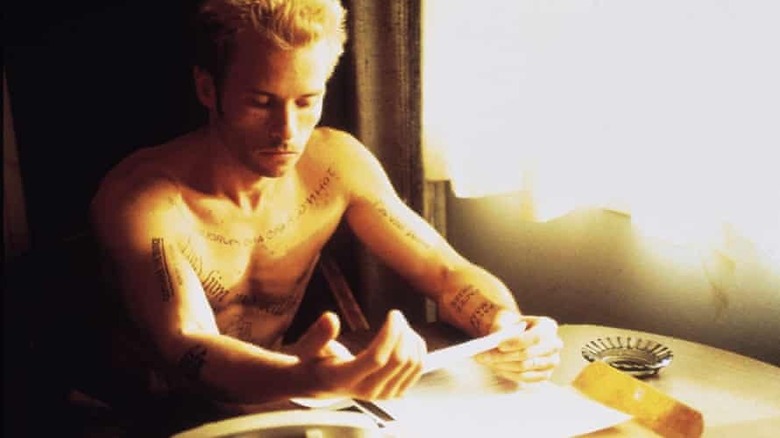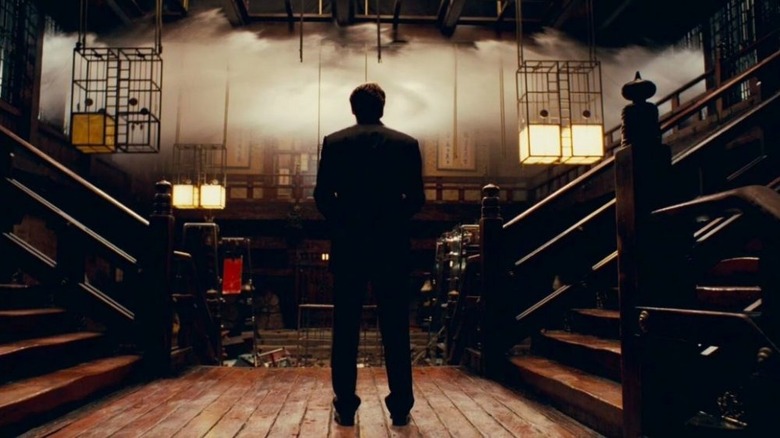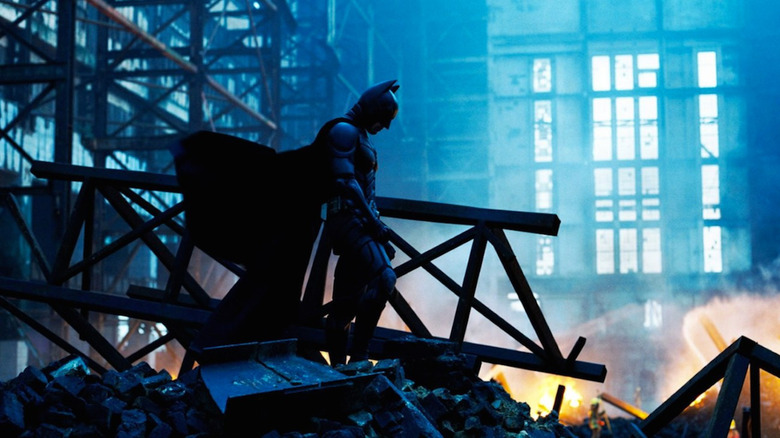Every Christopher Nolan Film Ranked Worst To Best
Christopher Nolan is easily one of the most influential filmmakers working today. While the "Dark Knight" trilogy ranks as his highest-grossing set of films to date, Nolan is one of the few directors who generates blockbuster-worthy box office takes for original stories. His mind-bending, special effects-heavy features have made him is a favorite among younger film fans, but he's often praised by his contemporaries as well.
The financial success of Nolan's films is matched by their critical acclaim. Known for their complex narratives, inventive setpieces, and playful experimentation with both non-linear narratives and time travel, Nolan's films generate lots of discussion among cinephiles. And while he's been criticized for emphasizing plot over character, Nolan has never had trouble finding exciting ensembles to populate his films. Nolan is unique in his blending of both cutting-edge technological advances and classical filmmaking techniques, including a mix of practical effects and CGI, and his passionate support of celluloid film over digital.
Ranking Nolan's films is a challenge, as even at his most indulgent productions are filled with awe-inspiring spectacle and ambitious ideas. None of his films are worth completely disregarding, but his best work is both emotionally resonant and holds up logically upon re-watching. Here are all 11 of Christopher Nolan's, films ranked worst to best.
11. Following
With shocking plot twists and austere characters, Christopher Nolan's directorial debut is certainly an interesting preview of what came later, but it's easily his weakest film thus far. Made with a tight budget, this $6,000 feature saw Nolan judicially using natural light and black-and-white 16mm film stock in order to keep production costs down. These constraints actually benefit the film's noir vibes, and while "Following" is an impressive achievement, it isn't really comparable to his more ambitious later work.
In "Following," an unnamed writer (Jeremy Theobald) stalks strangers in the London underworld, hoping to find artistic inspiration in the lurid setting. After an encounter with the ruthless burglar Cobb (Alex Haw), the writer decides to follow the serial criminal and becomes an accomplice to his robberies.
The issue with "Following" isn't the budget, but the characters; Theobald lacks unique characteristics, and Nolan's impressive heist sequences aren't impactful due to the lack of an emotional connection. Still, Nolan's nasty, hopeless depiction of the London underground is interesting in contrast to the polish of his later films, and the 70-minute runtime leaves little room for bloat. While "Following" shows the potential of a promising young filmmaker on the rise, it lacks the deeper philosophical underpinnings and rich characters of Nolan's later work.
10. Insomnia
While "Insomnia" is the only film of Nolan's career that he didn't also write, the neo-noir crime thriller doesn't lack his signature twisty storytelling. A remake of a 1997 Norwegian film, this investigative mystery follows an aging detective (Al Pacino) who must face up to the choices he's made during his career. It's one of Pacino's last great performances, and Nolan does a terrific job at deconstructing the character by questioning whether working outside the law is ever justified. Pacino's character, Will Dormer, claims he's only broken procedure when his suspicions are beyond reproach, and Nolan brilliantly emphasizes Dormer's anxieties through an Internal Affairs investigation that runs parallel to the main whodunnit.
While more straightforward than Nolan's later films, "Insomnia" is also one of his scariest. Dormer is a stranger within a small Alaskan community heartbroken by the murder of a teenage girl, and the LAPD detective is agonized by the coldness of the environment and local residents' reluctance to share details with an outsider. There's a foreboding anxiety that builds to the reveal of antagonist Walter Finch (Robin Williams), a villain who unnerves Dormer with his open admissions of guilt.
Accountability and guilt faced by a career lawman are not unique themes to "Insomnia," but Nolan explores them in a compelling, singular way. It's not a particularly rewatchable film given how cleanly the story wraps up, but it's a fascinating outlier within Nolan's filmography. Its low ranking is more a reflection of how solid Nolan's filmography is than a knock against "Insomnia" itself.
9. Tenet
"Tenet" takes time to understand, and not just because of the intricate nature of the film's central conceit, "time inversion." The tone can be off-putting; this is the closest thing to a James Bond movie that Nolan has ever made, but he trades 007's charismatic romanticism for a world of serious professionals who only communicate through their shared interest in work. While it may initially feel like Nolan is closing off his characters from emotion, nuanced performances by John David Washington, Robert Pattinson, and Elizabeth Debicki suggest that the characters are isolated by their inability to live normal lives when the fate of the globe is at stake.
While only dedicated Nolan obsessives may be able to keep up with the rapid-fire expositional dialogue, the goals of each set piece are always understandable. In "Tenet," Nolan crafts some of his most impressive action yet, with precisely orchestrated sequences such as the Oslo freeport heist and the opening opera escape made even more complicated through the intersection of past and future timelines.
"Tenet" overloads the viewer with information to the point that it's easy to miss key details; the traumatic environmental event that motivates antagonist Andrei Sator (Kenneth Branagh) is barely touched upon, in contrast to the laborious attention paid to explaining time inversion. The relentless pacing doesn't leave any room for boredom, but the critical attention that each scene requires can be exhausting.
8. The Dark Knight Rises
Given the number of superhero films that have come out since its release, "The Dark Knight Rises” has aged remarkably well, as it's a rare comic book film that explores consequences. There's a sense of finality that comes with concluding Nolan's Batman trilogy, and the scale of "The Dark Knight Rises" makes it stand apart from the intimate character study of "Batman Begins" and the sprawling crime saga of "The Dark Knight." Bane's (Tom Hardy) assault on Gotham is grandiose, but it doesn't stretch the believability that Nolan worked so hard to establish in the previous two films.
The eight-year gap between the death of Harvey Dent (Aaron Eckhart) and "The Dark Knight Rises" leaves Bruce Wayne (Christian Bale) broken, and it's interesting seeing the billionaire return to save a city that openly rejected him. It's the most emotional movie in the trilogy, particularly the heartbreaking conversations between Bruce and Alfred (Michael Caine), who begs his lifelong friend to move on from his crusade. Nolan doesn't forget to have fun, though — the banter between Bruce and Selina Kyle (Anne Hathaway) adds appropriate levity.
However, the logic of "The Dark Knight Rises” doesn't always hold up. Bane's scheme for overthrowing Gotham City is convoluted, and the awkward last-minute reveal of Talia al Ghul (Marion Cotillard) drags, especially given the nearly three-hour runtime. And yet, Nolan still manages to end on a high note, passing the Batman mantle to John Blake (Joseph Gordon-Levitt) in a beautiful final sequence that kicks the Hans Zimmer score into high gear.
7. The Prestige
"The Prestige," Nolan's first period film, examines the nature of artistry and the excitement surrounding emerging technology through a rivalry between two magicians, Alfred Borden (Christian Bale) and Robert Angier (Hugh Jackman). Their battle of wits makes the 19th century feel refreshingly modern. Of course, the real magician here is Nolan himself, who relies on narrative misdirection and uses a clever framing device — the film opens with Michael Caine explaining how magicians pull off their tricks — to deliver exposition and dance around some of the plot holes. "The Prestige" has science fiction elements, but they're introduced gradually, and the reveal of David Bowie as Nikola Tesla is as one of the coolest cameos in recent memory.
However, the cross-cutting between timelines and dueling perspectives grow grating as Nolan willfully withholds knowledge in order to preserve his big reveals. Bale and Jackman keep the story engaging, but convoluted plot twists make it hard to fully invest in either character. While lavishly designed, "The Prestige" lacks the emotional center of Nolan's strongest work.
6. Interstellar
Nolan has often listed Stanley Kubrick and Steven Spielberg among his primary inspirations. Fittingly, in "Interstellar," Nolan merges Kubrickian existentialism with Spielbergian family drama. "Interstellar" succeeds at both with a haunting depiction of time loops (a recurring element in Nolan's films) that's brought to life through the intimate story of a father (Matthew McConaughey) who's trying to fulfill a promise to his daughter.
Nolan spent years researching the science of black holes, wormholes, and the possibility of traveling beyond our solar system, and the insertion of plausible-sounding science makes McConaughey's plight to return home much more gripping. The science in "Interstellar" doesn't distract from the spectacle, and Nolan instills every planet with a distinct identity. Each one poses a different threat; a standout sequence in which McConaughey must dock his ship after it is sabotaged by the villainous Dr. Mann (Matt Damon) is absolutely riveting.
On the other hand, Nolan's dialogue can be inelegant, and the film occasionally descends into melodrama. While the notion that love transcends logic and reality is itself a satisfying conclusion to the space opera, the reveal is done through clumsy voiceover. A metaphorical approach would have been more effective.
5. Batman Begins
It's hard to overestimate how radically Christopher Nolan changed the public perception of the superhero genre. While the "Spider-Man" and "X-Men" franchises were still strong, Batman himself had been a laughing stock ever since the embarrassment of "Batman & Robin," and failures like "Hulk" and "Daredevil" failed to capture audiences' imaginations. Then came "Batman Begins," which proved that comic book films could be realistic, dramatic stories focused on characters, not bloated world building.
This origin story establishes the tragic events that spur Bruce Wayne into action, explains his fear of bats and how that led to his superhero identity, and shows how training with The League of Shadows physically prepared him for his mission while also inspiring his theatricality. Making the League of Shadows the film's antagonist bridges the gap between Batman's early history and his first mission, showing off Wayne's growth as he faces off against his former mentor, Ra's al Ghul (Liam Neeson).
Despite the darkness, "Batman Begins" is an earnest film that dedicates time to conversations about responsibility. It's the rare Nolan film that lacks spectacles, and the murky final act is far less interesting than the more intimate dialogue-driven scenes. Nolan would get better at directing action while making "The Dark Knight," a film he was clearly already thinking about while making "Batman Begins"; the closing shot, which teases the Joker, is one hell of a cliffhanger.
4. Dunkirk
In "Dunkirk," Nolan radically reimagined the World War II epic by portraying a historical event like a real-time suspense story. A week-long escape from the French beaches, a day-long mission to rescue the survivors of a naval conflict, and an hour-long aerial dogfight are presented simultaneously, depicting the entirety of the conflict as a heightened survival-thriller.
Each one of the three storylines is gripping, full of deeply human moments with and heroic characters. A young, naïve soldier (Fionn Whitehead), a humble working-class man (Mark Rylance) doing his patriotic duty, and a weary, tired soldier (Tom Hardy) each offer a different perspective on the theater of war, and despite the cross-cutting, the viewer doesn't lose track of any one story.
"Dunkirk" doesn't have much dialogue, but Nolan's thoughts on war come through in the film's final moments, as the soldiers note that survival in and of itself is a victory. Unlike many war films, "Dunkirk" doesn't rely on a key inspirational moment or infallible savior character. Rather, it's a collection of heroic moments from an entire community. "Dunkirk" is a conscious reimagining of a familiar genre, and one of the greatest war films ever made.
3. Memento
"Following" may be Nolan's debut, but "Memento" is the film that introduced him and his style to a broad audience. With "Memento," Nolan is clearly interested in puzzling his viewers, but it's not a mystery that favors complexity over human emotion. "Memento" hooks viewers with its clever structure, but the story itself makes them care, rendering the film's later revelations even more gripping.
Guy Pearce's protagonist, Leonard Shelby, is a man who cannot form new memories, and ends up being one of Nolan's strongest characters. "Memento" may use the "dead wife" cliché Nolan's often accused of employing, but Shelby's search for the culprit behind his spouse's murder is maddening given his inability to piece together the clues. He's befuddled, never quite sure where he is or what his short-term goals are, and Pearce captures his torment wonderfully. Nolan was working with a lower budget than his later projects employed, but he's incredibly economic, making the best of limited space. The striking black-and-white flashbacks add some variety to Nolan's visual palette, too.
Nolan earned his first Academy Award nomination for best original screenplay for "Memento," and the shocking twist ending provides a rewarding conclusion to a complex story. While some of Nolan's films take multiple re-watches to comprehend, "Memento" invites repeated viewings more than it demands them.
2. Inception
"Inception" sees Nolan firing on all cylinders, crafting an original summer blockbuster not based on any existing material. The sprawling mythology behind the movie's dream heists is complex, but Nolan methodically introduces information and themes through exciting, accessible action capers. The set pieces, especially the now-famous zero-gravity fight sequence, are among his best.
With "Inception," Nolan also proved that he could tell a dramatic story centered around family without descending into melodrama. Cobb (Leonardo DiCaprio) simply wants to reunite with his children and shield them from his horrible secrets; none of the visual spectacle would have any impact if Cobb didn't have a compelling motivation. DiCaprio does a terrific job stirring the viewer's empathy, and Nolan gives him a stacked and memorable ensemble to play off of, particularly Tom Hardy as the time-cracking forger, Eames.
Further, the epic runtime doesn't drain your attention because of how tight Nolan keeps the pacing. "Inception" is one of the quickest 150-minute movies you'll ever see, and the stirring final moments are among Nolan's most hauntingly beautiful, in part due to the memorable score by his frequent collaborator Hans Zimmer. A bold, breathtaking epic, "Inception" is among the most original films of the 21st century.
1. The Dark Knight
Nolan's second entry in his Batman trilogy set a new standard for superhero movies, summer blockbusters, and modern cinema. A study in dramatic escalation channeled through of costumed characters, "The Dark Knight" is a rich crime thriller that questions the lengths that good people will go to in order to achieve justice. Replacing campy fantasy with the thrilling intimacy of filmmakers like Michael Mann, "The Dark Knight" made superhero movies dark and gritty before that became a cliché.
Few movie characters have immediately entered the pop culture zeitgeist as quickly as Heath Ledger's Joker, who ranks among the greatest movie villains of all time. Ledger's twisted inventiveness is both utterly terrifying and disturbingly entertaining; he's so overwhelmingly powerful on screen that you can't help but relate to the movie's overwhelmed hero. Bale delivers another deeply-felt, emotional performance, and Aaron Eckhart's transformation into Harvey Dent plays up the tragedy in a story about the blurred lines between good and evil.
Nolan has created many iconic worlds, but "The Dark Knight ” takes the best of classic Batman storylines like "The Killing Joke" and "The Long Halloween” and funnels them through social commentary intended for a modern audience. A challenging consideration of morality that's also a riveting action spectacle, "The Dark Knight" is a modern classic, and will undoubtedly be the film Nolan is most remembered for throughout his career.
